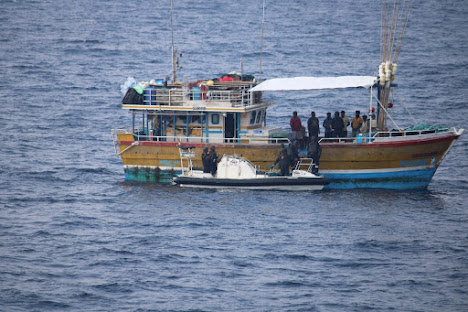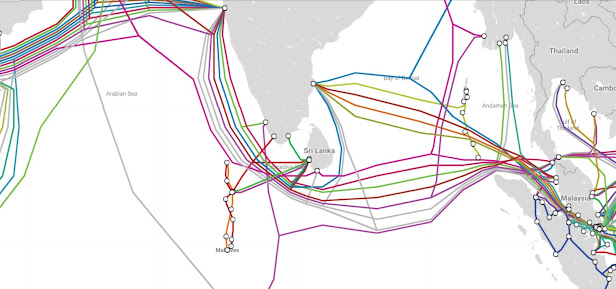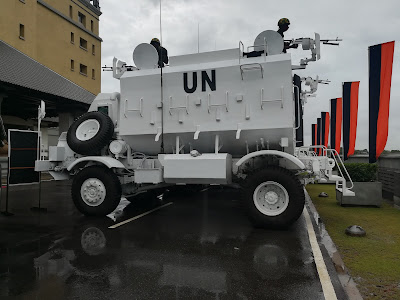Three Sri Lankan fishing boats seized with Weapons and Heroin
 |
| A Sri Lankan fishing vessel suspected of trafficking narcotics being boarded by Indian Coast Guard on 05 March, 2021. Pic - ICG. |
By Asiri Fernando
The Indian Coast Guard (ICG) intercepted three Sri Lankan fishing vessels near Minicoy Islands, off the Lakshadweep coast of India last week (18 March), and found them carrying five AK-47 assault rifles, 1000 rounds of ammunition and 300 Kgs of Heroin.
The ICG tweeted about the intercept, stating that "@IndiaCoastGuard· In a swift sea-air coordinated operation, #ICG intercepted 03 suspected boats off #Minicoy Island carrying 05 AK-47 rifles with 1000 live rounds and 300 Kg of Heroin. Boats being escorted to the nearest port for further joint investigation" The three vessels are being towed to the nearest port for investigation.
The intercept come days after another three local fishing vessels with 19 fishermen were arrested by Indian authorities earlier this month (05 March) on suspicion of smuggling narcotics.
Foreign news reports indicated that the three vessels intercepted earlier this month had dumped narcotics overboard when Indian authorities tried to board them. Two of the three vessels detained on 5 March have been released, with one vessel and its crew being held for ongoing investigations.
ICG intercepted another Sri Lankan fishing vessel with narcotic and several pistols earlier this year. In 2020, Sri Lanka authorities recovered several pistols, which they suspect were smuggled in with a batch of heroin.
The consignment intercepted on Thursday was likely destined for Sri Lanka, a senior navy officer told Defence Asia on terms of anonymity. He opined that the smuggling of arms likely indicates that some local crime networks are looking to replenish their arsenals. "However, five assault rifles and ammunition are no small matter. It is a significant security concern" he added.
Suspected linkages between organized crime such as narco-trafficking and the financing of terrorist groups have long been a concern for all countries in the region.
The Sri Lanka Navy (SLN) has had success intercepting a number of large heroin and methamphetamine (ICE) consignments in the deep seas off Sri Lanka and the Maldives over the last few years. Much of the narcotic traffic intercepted has been from the route dubbed 'the southern route' which originates from Afghanistan and begins the sea journey off the Makran Coast of Pakistan and Iran.
The Sri Lankan Navy has in the past credited the intercepts to regional technical intelligence sharing, local human intelligence gathering by law enforcement and naval intelligence and enchased patrolling by Offshore Patrol Vessels (OPV). The SLN intercepted 819 kg of Heroin, 895 kg of Methamphetamine (ICE), 581 kg of Ketamine and 4976 kg of Kerala Cannabis last year.
A number of successful intercepts by the SLN over the years may have caused the trafficking networks to explore new routes and look for safer mid-sea transfer points. Any future intercepts of Sri Lankan fishing boats engaged in trafficking off the Lakshadweep coast may be an indication of such pathfinder attempts.
With a large ocean area that needs to be patrolled amidst budget constraints, Sri Lankan authorities need to prioritize and expedite projects to improve maritime domain awareness(MDA), fisheries monitoring, public awareness regarding narcotics trafficking and its impact on communities.
Local stakeholders involved in countering trafficking efforts remain handicapped due to lack of a coherent policy on the issue. Lack of a well resourced, holistic approach to mitigate the threat calls in to question the Government's will to effectively address the matter.
Limited maritime air surveillance, poor remote-fisheries monitoring capability, inadequate access to time-critical imagery-based intelligence, lack of networked real-time data sharing and budgeting for long-endurance patrols are some key issues that need to be addressed urgently.
Further, the Sri Lanka Coast Guard (SLCG) remains under-resourced and underutilized as the primary maritime law enforcement agency. Given that a law enforcement approach is needed to address the trafficking problem, Sri Lanka has failed to effectively restructure the SLCG for its peacetime role. The SLCG can be empowered as the umbrella organization for law enforcement, compliance monitoring and safety at sea. However, the restructuring of the SLCG is a topic for another article.
Successive Governments have been dragging their feet on establishing an effective fisheries vessel monitoring system. Such a system is vital in countering trafficking efforts as organized crime networks have used local fishermen and their boats for trafficking for decades. A majority of contraband and drugs smuggled into Sri Lanka come via fishing vessels.
An area that needs to be better addressed is raising awareness among the vulnerable fisher communities to make them understand the consequences of trafficking. Many fisher crews, made of young individuals who are financially challenged, fall prey to the promise of quick profits by getting involved in trafficking.
Sri Lankan policymakers need to understand that the production of heroin continues in the "Golden Triangle" and the "Golden Crescent" at a large scale and the availability of chemical precursors point to continued large-scale manufacture of synthetic drugs for the foreseeable future.
With demand in Sri Lanka as well as the region on the rise, trafficking will be a long-term problem. There is a need for a holistic approach. A recent decision by the Government to move drug abusers towards rehabilitation and not to criminalize them is a move in the right direction.
A policy change that removes the death penalty for drug traffickers and law enforcement sector reforms may encourage a number of extra-regional countries and multi-national agencies to improve intelligence sharing, training and resourcing of Sri Lankan counter-trafficking efforts. Any effort to improve the local law enforcement agencies (LEA) efficiency and integrity will also be helpful to secure better intelligence sharing and resources.
Given the debacle suffered by the Police Narcotics Bureau (PNB) last year, when 15 of its officers were arrested on charges of maintaining links to narco-traffickers and engaging the trade themselves, a cloud of suspicion hangs over the agency that combats drug smuggling. Sri Lanka needs to take effective measure to stop the infiltration of such units by performing integrity checks and staffing through a strong vetting process.
On the regional front, India, the Maldives and Sri Lanka work closely on maritime security matters and recently established a tripartite security advisors secretariat at Navy headquarters in Colombo to enhance security cooperation. India has supplied Maldives with a Dornier Maritime Patrol Aircraft (MPA) and helicopters to enchase the archipelagos maritime surveillance capability.
Sri Lanka is in discussion with India to obtain an MPA for the Sri Lanka Air Force and Navy. Sri Lanka is also seeking to obtain two MPA's from the United States. While efforts by the Navy and Air Force to ''fill the gaps' in terms of air-maritime surveillance is commendable, the full benefits of the new platforms in the pipeline can only be fully realized when it is utilized as a tool in broader mechanism.



Interesting to see Sri Lanka is seeking to acquire two MPA's from the USA, I wonder what aircraft they are considering.
ReplyDeleteThey will likely be Beechcraft B360 variants. Given that SLAF has experience B200/300 in MPA role.
Delete